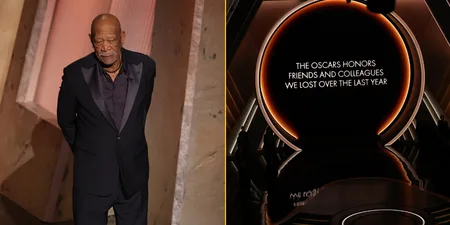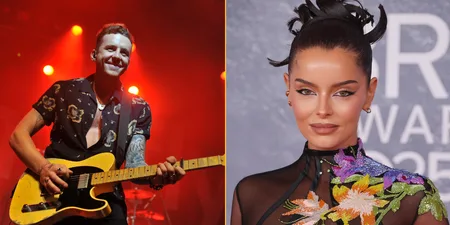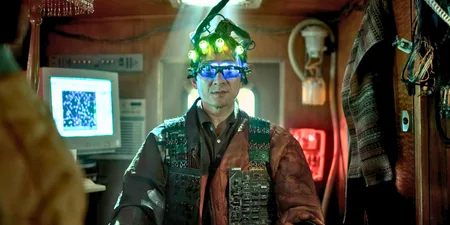A perfectly cromulent Martin Scorsese cover version from the guy that directed The Hangover
The long-awaited, ultra-hyped, and already much-discussed Joker origin movie sometimes feels like it might be about a lot of things – about class, about mental illness, about masculinity gone wrong. But really, despite a jaw-dropping lead performance from Joaquin Phoenix, it is just a movie about DC Comics.
It is a movie that exists because there is an intellectual property that exists, that’s about it. The crux of the movie is ‘What if Martin Scorsese’s 1983 Robert-DeNiro-starring celebrity satire The King of Comedy, where Robert DeNiro plays a struggling comedian who kidnaps a talk show host, was actually about the Joker?’ That’s it. That’s not a movie, that’s a message board post.
Joaquin Phoenix plays Arthur Fleck, a struggling comedian in an ill-defined late- 70s/early-80s Gotham City. We know he’ll become the Joker because the name of the movie is Joker. So we get ninety minutes or so of the world shitting on Fleck, trudging to the inevitable, until the final half-hour actually gives us the Joker action we actually want to see.
Fleck lives with his infirm elderly mother in a dank apartment. He gets fired from his dead-end job. He loses his healthcare after funding is cut. He fantasises about performing stand-up in front of his favourite talk show host (DeNiro, just to hammer home the King of Comedy connection).
The film mercilessly dumps on Fleck so much, it all becomes numbing, and ultimately boring – especially since we know how it all ends. There is plenty of interesting ideas here, but it doesn’t feel like the film is actually trying to say anything, just depict things from other movies.
The film borrows so heavily from the work of Scorsese – Fleck gets his hands on a revolver in a locker room extremely similar to the one Travis Bickle frequents in Taxi Driver, and the plot of the aforementioned The King of Comedy is basically borrowed wholesale. Scorsese was briefly involved in the film as a producer, and the movie makes no secret about its influences, but it all amounts to nothing. Cool, you’ve seen some films from the 1970s. What do you want, a medal?
The shoehorning of the serious content and the four-colour origins of the character never gel – a large amount of the narrative is devoted to Batman’s father Thomas Wayne, which only has resonance purely because it is the dad of a famous fictional character. Director Todd Philips (The Hangover, Old School) wants to nudge you in the ribs with nerd trivia while also making you think about society, man.
If this was a prequel to some pre-existing version of the Joker, it might at least give it some context, or some framework for why we’re watching all this doom and gloom. Instead, it just slots right into the stereotype of the 15-year-old boy screaming ‘No mom, my comics are serious and not for kids!’
Before Todd Phillips hit Hollywood pay-dirt with comedies like The Hangover, Due Date and Starsky & Hutch, he made his name with two cult gonzo documentaries – Hated: GG Allin and the Murder Junkies, following a notorious punk singer who’d fling his bodily excretions into the audience and start fights in the crowd, and Frat House, exploring the sadistic hazing traditions of US college fraternities.
Both were certainly memorable, but Phillips didn’t offer any great insight into either – it was just ‘Come look at this cool, nasty shit.’ And that’s how all the supposedly big themes are handled in Joker. Toxic masculinity, street violence, anti-capitalist protests, loneliness, poverty, nihilism, celebrity exploitation – the film has nothing to say about any of them, they are just there to look edgy and grown up, because Phillips heard about them on the news, or on Reddit.
This is not to say there are not things to enjoy in the film – most prominently, Joaquin Phoenix’s performance. The actor is not one to hold back – he famously gave up two years of his career to commit to a so-so mockumentary about becoming a rapper – and he leaps headfirst into Nic Cage level mega-acting here.
He contorts his body into odd shapes and laughs maniacally. There’s little subtly or depth in it, but when he finally gets to go full-Joker in the final act, he is thrillingly entertaining, and as mixed and muddled as this movie is, he would make a brilliant antagonist for Robert Pattinson’s upcoming Batman.
It is also a great looking film. The need for the period setting isn’t really clear, but Todd Phillip’s go-to cinematographer Lawrence Sher makes New York really look like the Gotham City of the 1980s Batman comics that inspired Joker (Brian Bolland’s The Killing Joke in particular). Instead of the street-level grittiness of 1970s new Hollywood, this is one element where the film blazes its own trail, capturing a hyper-detailed, stylised city, full of ironic street signs and fetishised period tech.
Maybe there is an argument to be made that we should think it is a good thing that a big $55 million dollar movie about difficult themes is being made by a major studio in 2019. But then again, this movie would never be made if it didn’t have a franchise IP slapped across it.
It is literally taking old films and neutering them for people who only watch things with superheroes in – and this is coming from someone who is a very big fan of superhero films, as well as DC Comics.
In 2017, Joaquin Phoenix starred in You Were Never Really Here, where he played a similarly violent disturbed individual looking after his elderly mother. It was brilliant, but only made $7 million at the US box office. Maybe they should have called it Penguin.








































